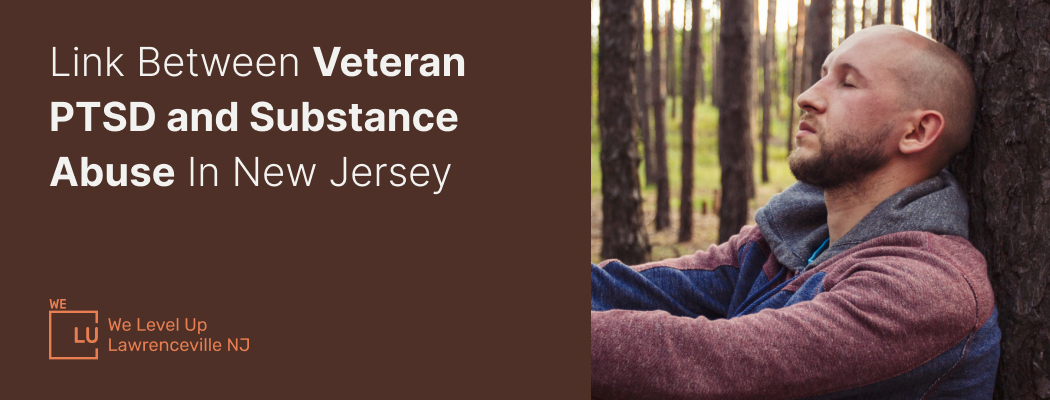There is a fact that’s been proven time and again: experiences that you go through while serving in the military are hard to convey. More often than not, they leave a lasting mark on your mental and physical state. Army duty and long-time exposure to war conditions may lead to PTSD, a condition that makes every single day feel like a battle even after you ditch your uniform. As you try to cope with trauma and overwhelming feelings, it’s quite possible to find solace in substance abuse. This sort of self-medication aimed at helping you forget and live trauma-free, unfortunately, leads to a cycle of substance abuse – a vicious circle that many veterans experience.
We Level Up Lawrenceville NJ is here to help you learn more about the link between veteran PTSD and substance abuse and identify the triggers for both of these conditions. We can help you face your challenges, regain your purpose, and start rebuilding your future.
Skip to:
How are veteran PTSD and substance abuse related?
The things you went through during your service might affect your life in many ways. PTSD is a condition that emerges as a response to the trauma you have faced. It can show up in many ways: nightmares, flashbacks, feeling constantly on edge. It is common and perhaps to a certain extent understandable that you might turn to medication or alcohol, searching for some relief or escape from these relentless memories and feelings.
The PTSD and addiction correlation isn’t a coincidence. When you are a part of the cycle of veteran substance abuse and PTSD, you use drugs or alcohol to cope with the pain and trauma. Initially, it might seem like it helps. However, over time, it leads to serious cases of substance abuse disorder (SUD) and complicates your life even more. The substances that once seemed to give you a way out can start to add to the problems and make your PTSD symptoms more intense. All this makes it harder to find your way back.

You are the vulnerable piece of this cycle for a few reasons. The military culture, which often emphasizes toughness, might make it hard for you to reach out for help and solve mental health challenges. Sometimes, there is a stigma around owning up to your struggles. This leads to isolation and a sense that you have to handle this personal hell by yourself. On top of all of this, adjusting to life after service can be difficult and demanding, as it makes you feel out of place. This only amplifies the connection between veterans’ trauma and substance abuse.
What do studies tell us about veteran PTSD and substance abuse?
To understand PTSD and substance abuse in veterans better, let’s take a look at some studies and statistics. There are many veterans living in New Jersey. Precisely, there were 350,538 veterans in New Jersey in September 2019. Studies show us that when veterans experience trauma, especially if they’ve been injured or hospitalized during their service, they are more likely to turn to alcohol or drugs. Veterans who struggle with substance use disorders (SUDs) are three to four times more likely to be diagnosed with PTSD or depression. This is a significant indicator of how closely related these challenges are.
Let’s look at conflicts that were the cause of many veterans with PTSD and substance abuse. In Afghanistan and Iraq, 63% of those diagnosed with SUDs also meet the criteria for PTSD. This overlap shows that military trauma and substance use are connected, and veterans use substances as a form of coping or escape.
Moreover, a study from 2017 that reviewed the National Survey on Drug Use and Health data pointed out some concerning trends among veterans compared to non-veterans. Veterans reported higher rates of alcohol use within a one-month period (56.6% vs. 50.8%) and were more likely to engage in heavy alcohol use (7.5% vs. 6.5%). Furthermore, when veterans seek treatment for substance misuse, 65% identify alcohol as their primary substance of misuse.
Get Help. Get Better. Get Your Life Back.
Searching for Accredited Drug & Alcohol Rehab Centers Near You? Or Mental Health Support?
Even if you have failed previously, relapsed, or are in a difficult crisis, we stand ready to support you. Our trusted behavioral health specialists will not give up on you. Call us when you feel ready or want someone to speak to about therapy alternatives to change your life. Even if we cannot assist you, we will lead you wherever you can get support. There is no obligation. Call our hotline today.
FREE Addiction Hotline – Call 24/7Identifying PTSD triggers and substance abuse patterns
To start your healing process, you must first learn how to identify PTSD triggers. On top of that, you should know how veterans addiction and PTSD are connected. Here are common triggers you should know:
- Loud noises: Sounds that mimic gunfire or explosions can instantly transport you back to traumatic events. They increase your anxiety and stress levels. Turning to substances may seem like a quick way to dull these intense reactions.
- Crowded places: Being in crowded or confined spaces might make you feel trapped or on high alert, similar to combat situations. You might use alcohol or drugs in an attempt to manage these feelings of panic or to feel more at ease in social settings.
- Stressful anniversaries: Certain dates that remind you of traumatic incidents can reignite feelings of sorrow, anger, or fear. Substance use might become a way to try to escape these painful memories.
- Conflict: Arguments or interpersonal conflicts can trigger feelings of frustration or helplessness, echoing the chaos of combat. You might find yourself using substances to cool down or numb these emotional responses.
- Media coverage: News reports or images related to war or violence can trigger PTSD symptoms, making it difficult to separate past dangers from current safety. This may lead to increased veteran trauma and substance use as a coping mechanism for the distress.

Treatment options available in New Jersey
Luckily, veterans struggling with PTSD and substance abuse in New Jersey have available choices for comprehensive treatment. If you or someone close to you has these issues, you need to get in touch with a center that specializes in treating both issues simultaneously, dealing with the root causes of problems as well as the consequences.
How we are able to help you
We Level Up Lawrenceville NJ team of addiction and behavioral health professionals in New Jersey offers tailored programs for veterans with PTSD and substance abuse. Here, you can expect a supportive environment that will help you address both issues. In order to address your overall well-being, we use a holistic approach that includes therapy, medication management, and support groups.
We will welcome you to a community that understands what you are going through and has the tools to help you heal. What we offer is compassion and expertise; add to that your willingness and commitment, and together, we can overcome challenges and start rebuilding your future.

Get Your Life Back
Find Hope & Recovery. Get Safe Comfortable Detox, Addiction Rehab & Mental Health Dual Diagnosis High-Quality Care at the We Level Up Treatment Centers Network.
Hotline (877) 378-4154Specialized therapy and rehabilitation programs
Many people struggle with similar challenges as you. However, what you are going through is still unique. The combination of PTSD and substance abuse in veterans is complex, and you need specialized care to overcome these challenges. You need an approach that takes your individual experiences into account and gives you strategies that work best for you. During specialized therapy, you will have a guide known as a substance abuse counselor. It is a person who guides you, knows you well and understands you.
Substance abuse counselors use many therapeutic techniques that will help you the most., and their responsibilities include:
- Assessment: They identify your specific needs and challenges, including any co-occurring mental health conditions that go along with substance use.
- Planning treatment: They develop a personalized treatment plan that includes therapeutic techniques to manage your addiction and PTSD effectively.
- Providing therapy: These professionals conduct one-on-one or group therapy sessions that help you process your experiences, understand your behaviors, and learn new strategies for coping with stress, trauma, and triggers.
- Support and guidance: They give you ongoing support, guide you, and help you set realistic goals and celebrate your progress.
- Education: Also, substance abuse counselors educate you about the nature of addiction and mental health. This way, they empower you with the knowledge to understand and combat your challenges more successfully.

Coping mechanisms and support groups
Coping mechanisms are tools you can use to help manage your feelings and reactions in a healthy way. Effective coping mechanisms for veterans with PTSD and substance abuse include:
- Breathing techniques: Simple but powerful. When you feel overwhelmed, taking slow, deep breaths can calm your mind and body.
- Exercise: Moving your body can help reduce stress and improve your mood. It doesn’t have to be intense; even a daily walk makes a difference.
- Healthy routines: Having a regular schedule for meals, sleep, and activities can provide stability and a sense of normalcy.
- Hobbies: Doing things you enjoy can be a great distraction and a way to express yourself.
- Talking to someone: Sometimes, just sharing what you’re going through can lighten your load. This could be a friend, family member, or therapist.
Importance of support groups
There are many people who share your struggles and group therapy is often very helpful in this context. Support groups for veteran substance abuse and PTSD bring together people who understand what you’re facing because they’ve been there, too. These groups give you a safe space to share your experiences, challenges, and successes. Hearing from others can give you new insights and remind you that recovery is possible.
Support groups for veterans with PTSD and substance abuse offer the kind of acceptance that can be hard to find elsewhere. It’s a place where you can be honest about your struggles without fear of judgment. This sense of community is something that people find incredibly healing.
First-class Facilities & Amenities
World-class High-Quality Addiction & Mental Health Rehabilitation Treatment
Rehab Centers TourRenowned Addiction Centers. Serene Private Facilities. Inpatient rehab programs vary.
Addiction Helpline (877) 378-4154Proven recovery success experience, backed by a Team w/ History of:
15+
Years of Unified Experience
100s
5-Star Reviews Across Our Centers
10K
Recovery Success Stories Across Our Network
- Low Patient to Therapist Ratio
- Onsite Medical Detox Center
- Comprehensive Dual-Diagnosis Treatment
- Complimentary Family & Alumni Programs
- Coaching, Recovery & Personal Development Events
Substance abuse assessment
Before you can find the right coping strategies and support, we learn about your specific needs through a substance abuse assessment. This process helps identify the extent of your substance use and any co-occurring disorders such as PTSD. Think of it as a starting point for your recovery process.
A professional will typically conduct the assessment and speak with you about your substance use, mental health, and how they affect your life. It’s a chance to look at the big picture and decide on the best approach to treatment. Based on the assessment, together, we can explore therapies, coping mechanisms, and support groups that fit your situation.
Insurance and financial support
One of the first steps in your recovery journey will be to become familiar with your insurance plan. Look into your policy details to understand what types of rehabilitation services it covers. This includes checking for coverage on inpatient programs, therapy sessions, and any specific treatments for PTSD and substance abuse.

Alcohol detox and recovery in New Jersey
Alcohol abuse has long been on the list of top issues for veterans trying to cope with PTSD. This is why We Level Up offers alcohol rehab for veterans, along with dual diagnosis program. The process begins with alcohol detox in NJ. It makes your body adjust to functioning without alcohol, which can be difficult, and, at times, medically risky, mainly because of the withdrawal symptoms. They can be physically and emotionally tiring. Alcohol withdrawal symptoms range from mild anxiety and sleep disturbances to more severe causes like tremors, seizures, and delirium tremens. These symptoms become more intense because of the stress and trauma linked to PTSD.
Although challenging, there are ways we can solve the problems of alcohol detox and recovery. They include the following:
- Medical supervision: We strongly recommend detoxing under medical supervision in a specialized facility. Here in our New Jersey treatment center, we can manage withdrawal symptoms safely and provide veterans with suitable care to ease discomfort and reduce the risks.
- Support groups and therapy: Engaging in support groups specifically for veterans can be incredibly beneficial during and after detox. Therapy, particularly cognitive-behavioral therapy (CBT) and other modalities effective in treating PTSD, can also play a crucial role in recovery, helping you develop healthier coping mechanisms.
- Continued care: Recovery doesn’t end with detox. Participating in ongoing treatment and rehabilitation programs ensures you have the support necessary to maintain sobriety. This can include outpatient therapy, support groups, and wellness activities designed to support overall mental and physical health.

Seeking help is a sign of courage for veterans with PTSD and substance abuse issues
Being a veteran comes with a set of challenges that most people never have to face. You’ve experienced things that can leave deep marks, both visible and invisible. It’s these experiences that can sometimes lead to the link between veteran PTSD and substance abuse. Seeking comfort or an escape from the memories and feelings that accompany your service is completely understandable. Yet, this path often becomes a cycle that’s hard to break on your own. What you’re going through is tough, but there’s a way forward. The first step is acknowledging the need for help. Be brave and reach out to people and resources ready to support you. Rediscover your strength, find peace, and move forward with your life.
Sources:
- https://www.va.gov/vetdata/docs/SpecialReports/State_Summaries_New_Jersey.pdf
- https://nida.nih.gov/publications/drugfacts/substance-use-military-life
Experience Transformative Recovery at the We Level Up Treatment Center.
See our authentic success stories. Get inspired. Get the help you deserve.



Start a New Life
Begin with a free call to an addiction & behavioral health treatment advisor. Learn more about our dual-diagnosis programs. The We Level Up treatment center network delivers various recovery programs at each treatment facility. Call to learn more.
- Personalized Care
- Caring Accountable Staff
- World-class Amenities
- Licensed & Accredited
- Renowned w/ 5-Star Reviews